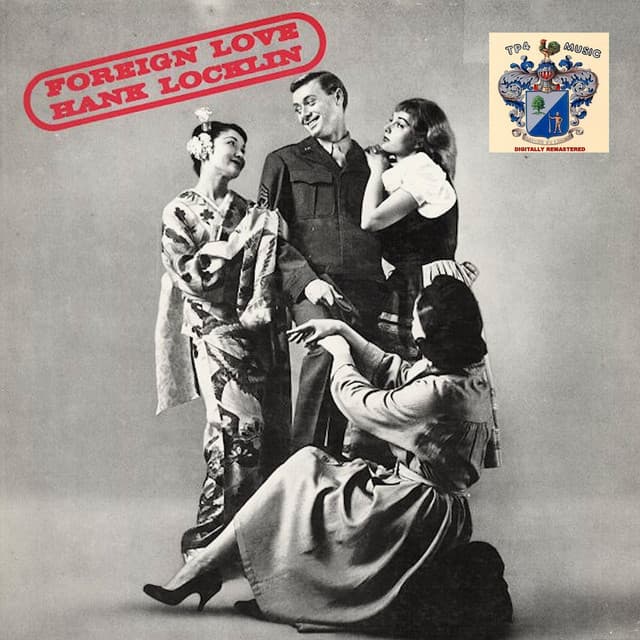
An Ocean Apart: The Lingering Tenderness of a Soldier’s Far-Off Love, Echoed Across Continents
Hank Locklin‘s tender and deeply sentimental ballad, “Geisha Girl”, captured the hearts of country music fans, soaring to the prestigious number 1 spot on the Billboard Hot Country Singles chart in January 1958. This wasn’t merely another chart-topper for the smooth-voiced country crooner; it was a delicate, cross-cultural tale of a fleeting, yet profound, connection, solidifying Locklin‘s place as a master of earnest and emotionally resonant storytelling. The song’s immense popularity also led to a significant crossover success, reaching an impressive number 66 on the Billboard Hot 100 pop chart, a testament to its broad appeal beyond the traditional country audience during that era. Featured on his album “Please Help Me, I’m Falling” (though released as a standalone single well before that compilation), “Geisha Girl” quickly became a beloved classic, a pervasive presence on radio waves, forever associating Locklin with its gentle, melancholic narrative of a soldier’s distant affection.
The story behind “Geisha Girl” is rooted in the insightful songwriting of Wayne Raney, a prominent country musician and songwriter. Raney crafted a lyric that perfectly captures the bittersweet experience of American servicemen stationed in post-World War II Japan, many of whom formed sincere, albeit often temporary, romantic bonds with Japanese women. The term “Geisha Girl” itself, while perhaps a simplification in the context of the complex historical and cultural role of geisha, was used broadly in popular Western culture of the era to refer to Japanese entertainers or companions, and here signifies a particular kind of exotic, gentle, and often transient, love. The narrative is a first-person reflection of a soldier, now back home, wistfully recalling the tender moments shared with a woman he left behind. It speaks to the unique emotional landscape of relationships formed in foreign lands—intense, culturally nuanced, and often destined to be brief. Hank Locklin, with his signature smooth tenor and his earnest delivery, was the perfect voice to convey this profound sense of yearning and respectful remembrance. His rendition imbued the song with an authenticity that made listeners believe every word, tapping into a shared understanding of love lost to distance and duty.
The meaning of “Geisha Girl” is a tender and nostalgic exploration of a brief, yet deeply cherished, romance experienced in a foreign land, specifically Japan, by an American serviceman who is now far away. It’s a song about the enduring memory of a past love, conveying a poignant sense of longing and respect for the woman he left behind. The lyrics paint a picture of a gentle, idealized connection, where the beauty of the “Geisha Girl” and the memories of their time together continue to haunt and comfort the protagonist across the miles. Lines like “Geisha Girl, Geisha Girl / Oh, you’re the sweetest flower in this whole wide world” convey a deep admiration and tenderness, while the repeated reference to distance (“across the blue Pacific”) emphasizes the pain of separation. It speaks to the universal human experience of carrying the ghosts of past affections, the bittersweet understanding that some loves, though fleeting, leave an indelible mark, and the way specific cultural encounters can forever shape one’s heart, leaving a permanent imprint of a faraway tenderness.
Hank Locklin‘s vocal performance on “Geisha Girl” is simply exquisite in its ability to convey tender wistfulness. His voice, clear and resonant, delivers the sentimental lyrics with a quiet grace and an aching tenderness that makes the listener feel the depth of his nostalgic longing. He sings with a heartfelt sincerity that avoids any grandiosity, choosing instead a profound intimacy that resonates deeply. The arrangement, characteristic of the nascent Nashville Sound of the late 1950s, is beautifully restrained, featuring soft steel guitar accents that weep with a gentle sadness, and subtle, almost tinkling, instrumental touches that evoke a delicate, exotic atmosphere. This elegant production allows Locklin‘s expressive voice and the song’s poignant narrative to take center stage, creating an incredibly moving and memorable listening experience that has stood the test of time and continues to resonate with its quiet beauty and respectful sentiment.
Listening to “Geisha Girl” today evokes a particular kind of profound nostalgia, transporting us back to a golden era of country music when ballads were crafted with such delicate emotion and vocal purity. It reminds us of Hank Locklin‘s unique gift for imbuing simple lyrics with immense emotional weight, making them feel like a cherished secret or a personal confession. For those of us who recall its pervasive charm on the airwaves, this song remains a timeless anthem of tender separation, a beautiful yet sorrowful testament to the enduring power of a love left behind in a faraway land. It’s a cherished melody that, even after all these years, continues to whisper its plaintive refrain, reminding us that some memories, like the gentle image of a “Geisha Girl,” are destined to live forever in the heart, bridging oceans with their quiet, persistent beauty.